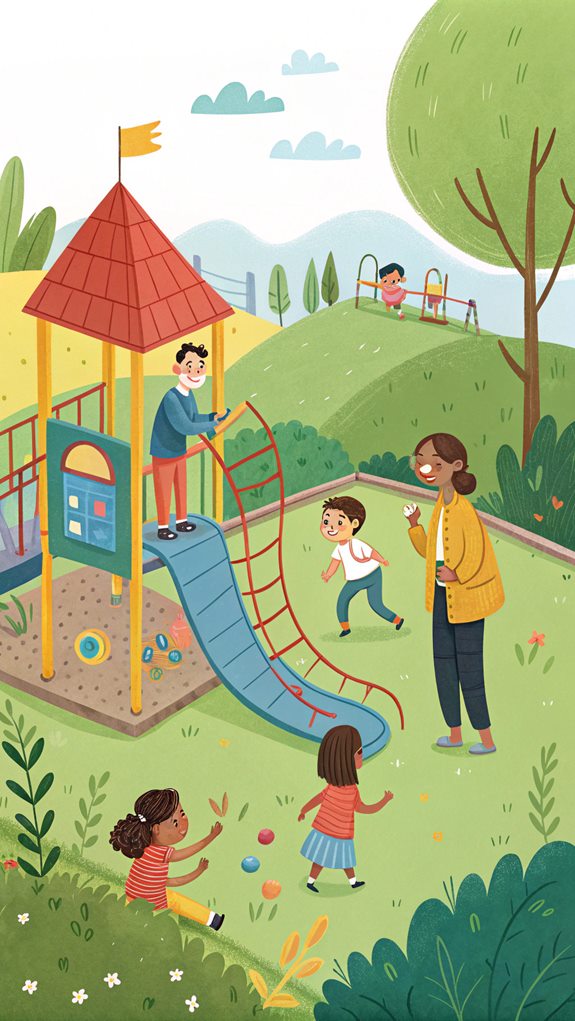Raising kids ain’t a walk in the park, but it doesn’t have to be a total circus either! The best advice? Mix in love, structure, and let ’em fall a bit—it helps them learn to get back up! Spend time together, even during chaos, and keep those dinner chats flowing. Let them tackle challenges so they can build grit. Set clear rules, but don’t forget to make it fun! Oh, and don’t neglect your own sanity; happy parents make happy kids. Stick around, and you’ll uncover even more gems to help on this wild parenting ride!
Key Takeaways
- Prioritize spending quality time together, establishing routines that provide comfort and security for children.
- Emphasize effort over results, fostering resilience and a growth mindset in your children.
- Encourage independence by allowing children to make choices and take on age-appropriate responsibilities.
- Maintain open communication about feelings to develop emotional intelligence and create a supportive environment.
- Model self-care and healthy habits, promoting emotional well-being and resilience in both parents and children.
Quality Time and Presence

When it comes to raising children, many parents believe that “quality time” is the key to connection, but the truth is that all time spent together holds value.
Think about it—just being there, even during the mundane moments, can create a strong bond. Routine is like a warm blanket of comfort for kids. It helps them feel secure and know what to expect.
Dinner discussions? They’re gold! Chatting over a meal not only strengthens family ties but also gets your kids thinking deeply. Who knew talking about broccoli could lead to a philosophy debate?
Now, let’s talk about work. If you’re always glued to your computer, your kids might think work is boring. Instead, show them that you love what you do. It’ll inspire them to find joy in their own passions.
And don’t underestimate those quick shifts from work to family time. When you change gears smoothly, you’ll engage more with your kids. It’s all about being present.
Embracing Struggle and Resilience
Struggle is an inevitable part of life, and embracing it can be a powerful tool in raising resilient children. Instead of shielding them from every bump in the road, why not let them trip a little? It builds character! Here are some parenting tips to help you and your kids tackle challenges together.
| Tip | Description |
|---|---|
| Emphasize Effort | Focus on hard work, not just the end result. |
| Introduce Manageable Struggles | Let them face small challenges to grow. |
| Share Hardships | Bond over tough times; it teaches teamwork and support. |
Encourage your kids to see mistakes as learning opportunities. When they mess up, remind them it’s just a stepping stone, not a stumbling block. Positive framing helps too! If they face a setback, help them find gratitude in the experience. This shifts their mindset from “Why me?” to “What can I learn?”
Support and Independence

Nurturing independence in children while providing support is essential to their growth. Think of it like being their safety net while they’re on a tightrope. Kids need to feel free to make choices, but knowing you’re there if they wobble gives them the confidence to try.
Enable your little ones to own their decisions. When they choose their outfits or decide on their snacks, they’re learning about independence—and hey, it builds self-confidence too!
Teaching them about trade-offs is a great way to introduce responsibility. If they want that cool toy, they might’ve to save up some of their allowance. Celebrating their milestones, whether it’s mastering tying their shoes or acing a test, shows them you notice their efforts. It reinforces their belief that they can handle responsibilities on their own.
And don’t forget chores! Encouraging kids to help out around the house isn’t just a sneaky way to lighten your load. It instills a sense of responsibility that’s vital for long-term independence.
Emotional Awareness and Communication
Emotional awareness and communication are crucial for nurturing healthy relationships within the family. You know how sometimes you can feel a storm brewing just because the kids skipped lunch? Recognizing those emotional states, like hunger, can save you from a world of irritability. Seriously, a snack can work wonders!
Encouraging open discussions about feelings helps your children develop emotional intelligence. It’s like giving them a map to steer through their own emotional seas. Ask them how their day went. Celebrate their little wins instead of just your own. This builds self-esteem and shows them that their feelings matter.
But don’t forget about your emotional health! Your mood can be contagious, so keep an eye on how you’re feeling. When you’re calm, it’s easier for your kids to share their feelings with you.
Plus, you’ll all get along much better.
Parenting Styles and Character Building

Every parent faces the challenge of balancing guidance and independence while shaping their children’s character. You want to be their guiding light, but not so bright that they can’t find their own way. Remember, your parenting styles matter more than you think!
Here’s a little table to illustrate this:
| Parenting Style | Character Development |
|---|---|
| Authoritative | Independence & Confidence |
| Authoritarian | Fear & Resentment |
| Permissive | Entitlement & Confusion |
| Neglectful | Insecurity & Struggles |
| Balanced Approach | Resilience & Grit |
Modeling good behavior is key—actions speak louder than words. When you encourage your kids to own their choices, you help them build self-efficacy. Celebrate their efforts, not just the outcomes. After all, it’s about the experience, not just the trophy.
Establishing Rules and Boundaries
Establishing rules and boundaries in your home is like setting a sturdy fence around a garden; it defines the space where your children can grow safely.
Think of rules as your family’s playbook, helping everyone know the game. Start by laying down clear and reasonable rules for behavior. These shape your child’s self-management skills and set expectations.
Get your kids involved in discussions about these rules. When they understand the “why” behind them, they’ll feel more connected and responsible. Who doesn’t want to feel like they’re part of the team, right?
Now, here’s the kicker: consistency is key! If you enforce rules inconsistently, it’s like trying to play soccer without a goal – total chaos!
Use age-appropriate language, too. You wouldn’t explain calculus to a toddler, so keep it simple.
And don’t forget to revisit these rules regularly. Kids grow and change faster than you can say “time-out,” so adapt them as needed.
In short, establishing rules and boundaries isn’t just about discipline; it’s about creating a safe space where your children can thrive. You’ve got this!
Fostering Independence and Social Skills

Once you’ve set rules and boundaries, the next step is to cultivate independence and social skills in your children.
It’s like giving them the keys to their own little kingdom, where they can rule with confidence and kindness!
Here’s how you can help them thrive:
- Encourage age-appropriate decisions. Let them feel the thrill of choice (and maybe a little consequence).
- Promote sharing and taking turns during playtime. This helps them learn empathy while avoiding the dreaded “mine” war.
- Arrange regular playdates. These little social experiments teach negotiation skills and the art of compromise—like tiny diplomats in training!
- Assign some simple chores. Trust me, watching them take ownership of their tasks builds confidence faster than you can say “clean your room.”
- Discuss feelings openly. Talking about emotions enhances their emotional intelligence, clearing the path for healthy future relationships.
Importance of Parental Self-Care
Taking care of yourself as a parent isn’t just a luxury—it’s a necessity. If you’re running on empty, how can you fill up your kids? Parental self-care is the secret ingredient to keeping your emotional health in check. When you take time for yourself, you’re better at handling stress and can engage with your little ones positively.
Research shows that parents who prioritize self-care feel less burnt out. This means a happier home for everyone. Whether it’s hitting the gym, diving into a hobby, or grabbing coffee with friends, these moments help you recharge.
Plus, when you model these healthy habits, your kids soak it up too. They’ll learn to cope with life’s ups and downs, just like you.
Setting aside personal time also enhances your patience. When you’ve had that much-needed break, you’re more likely to respond calmly during those challenging moments.
Don’t forget to lean on your support system—friends, family, or even a professional. It’s great for you and teaches your kids the importance of community.
Conclusion
Raising kids isn’t just a walk in the park; it’s more like climbing a mountain while juggling flaming torches! But hey, with quality time, a sprinkle of struggle, and a touch of humor, you can totally rock this parenting gig. Remember, it’s all about finding that sweet spot between guiding them and letting them soar. And don’t forget to take care of yourself too—you can’t pour from an empty cup, right? Happy parenting!
Join our list
Subscribe to our mailing list and get interesting stuff and updates to your email inbox.

